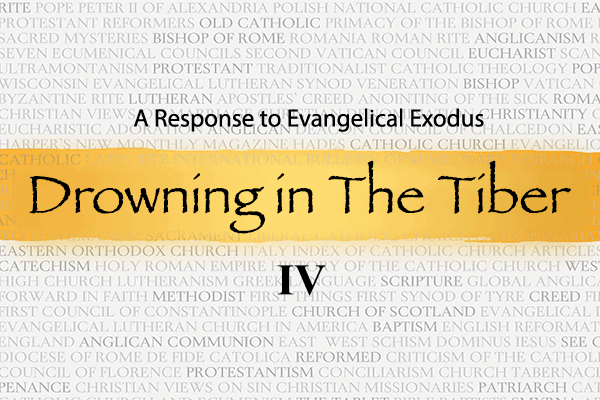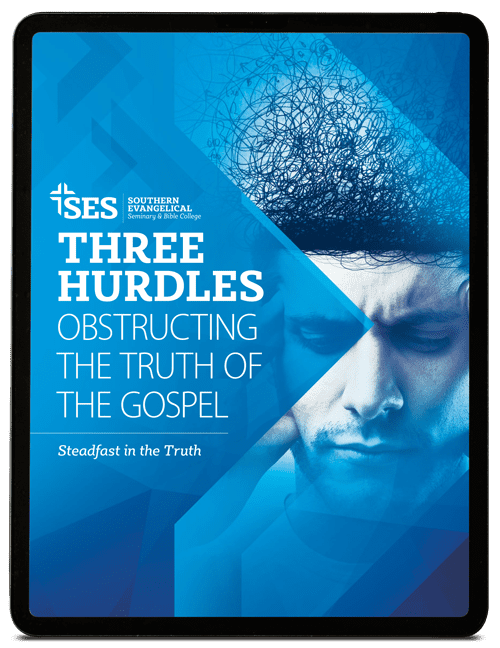See Part 1, Part 2, and Part 3.
Introducing a quote from Aquinas, Beaumont says, “Somewhere along the line I came across this quotation from Thomas Aquinas that really convicted me of my theological autonomy” (Beaumont, Evangelical Exodus, 46).
Now the formal object of faith is the First Truth, as manifested in Holy Writ and the teaching of the Church, which proceeds from the First Truth. Consequently whoever does not adhere, as to an infallible and Divine rule, to the teaching of the Church, which proceeds from the First Truth manifested in Holy Writ, has not the habit of faith, but holds that which is of faith otherwise than by faith. . . . Now it is manifest that he who adheres to the teaching of the Church, as to an infallible rule, assents to whatever the Church teaches; otherwise, if, of the things taught by the Church, he holds what he chooses to hold, and rejects what he chooses to reject, he no longer adheres to the teaching of the Church as to an infallible rule, but to his own will. (Summa Theologiae II–II, 5, 3)
Here, Beaumont is exercising the very autonomy of which he claims to have been convicted. He had to arrive at his conclusion on the basis of his own theological and philosophical presuppositions. Before he reached his conclusion, he evaluated the various theological and philosophical positions, and, as an autonomous, independent thinker, he had to make a decision about which theological and/or philosophical position most closely fit with his own thinking. Before he accepted the authority of the Church, he had to learn about this authority and study it in an effort to understand it so that he could make his choice. That action was necessarily the action of an individual with theological/and or philosophical autonomy. Beaumont could not surrender his autonomy until he used his autonomy to discover that he wanted to accept the authority of the Church.
He also says,
To be honest, I never really reached a point of total comfort with the idea of becoming Catholic, but I came to think that perhaps God wanted me to make a true faith decision—not just one more move from one form of Christianity to another according to my personal preference. God had made it possible for me to make this choice—but not necessary. I resonated with Peter’s words recorded in John’s Gospel: “To whom shall I go?” (cf. Jn 6:68) (Ibid., 47; emphasis in original).
Beaumont as much as explains that he came to his conclusion as an autonomous thinker. He could not “move” until he had discovered that he resonated with Peter’s words. God indeed made it “possible” for him to make this choice, but Beaumont had to decide to move in order to actualize the possible. He goes on to say, “This description of how heretics treated theology was dangerously close to my own. It seemed I had really been trusting in my own thinking and experience all along (and indirectly teaching others to do the same). While I rejected this practice in principle, it was difficult to transition out of it. Becoming Catholic would mean choosing to trust the Church instead of myself, and sometimes the two did not sync well” (Ibid., 47). Clearly Beaumont trusted his own thinking in order to make his choice. He says he realized he needed to trust the Church instead of himself, but he necessarily had to trust himself in order to arrive at the notion that he needed to trust the Church rather than himself. In fact this is precisely what he admits when he refers to making his choice. He says, “I came to think that perhaps God wanted me to make a true faith decision . . .” (Ibid.; emphasis in original). But, how did he arrive at the notion that it was God who wanted him to make a true faith decision? He could not make a true faith decision before he realized that it was God who wanted him to make a true faith decision. In other words, he had to evaluate his own experience and his own theological/philosophical understanding to make a “true faith decision” before he learned that he needed to make a true faith decision.
Conclusion
Beaumont’s article is fraught with self-referential problems, logical fallacies, and disingenuous characterizations. He seems to be completely unaware of the fact that he is doing precisely what he condemned others for doing. Earlier Beaumont lamented that he lost some friends “due to unfortunately uncharitable debate (on both sides . . .) (Ibid., 44). But Beaumont has been the most “uncharitable” debater. He characterized Evangelicals as more interested in setting up popularity than truth. He implies that Evangelicals lack any understanding of the church fathers. He accuses Evangelicals with hating Catholics, and he applauds the Catholics as appreciating much in Evangelicalism, indicating that Evangelicals are immoral while Catholics possess the moral high-ground. Also he charges Protestantism’s history as one that suffers “a steady decline in the appreciation for the role of material creation in Christian faith and practice” (Ibid., 35). He declares that Evangelicals are functional Gnostics. There are some additional accusations from Beaumont’s article. As it turns out, Beaumont is as uncharitable as those whom he condemns. Once someone understands that Beaumont is condemning others while doing precisely the same actions, it becomes clear that his article is largely a case of smoke and mirrors. There will no doubt be those who believe that I am being uncharitable toward Beaumont, but I believe Beaumont forfeited the expectation of charity with his own uncharitable criticisms of Protestantism and Evangelicalism. Beaumont’s article is essentially an essay-sized exercise in the ad hominem abusive fallacy.






